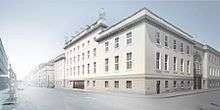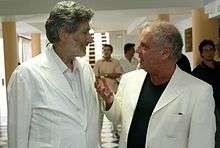Barenboim–Said Akademie
The Barenboim–Said Akademie (German: Barenboim-Said Akademie, Arabic: أكاديمية بارنبويم-سعيد, Hebrew: אקדמיית ברנבוים-סעיד) is an academy located in Berlin, Germany, offering Bachelor degrees and Artist Diploma certificates in music; it opened on December 8, 2016.[1] It was co-founded by the conductor and pianist Daniel Barenboim and the literary theorist Edward Said.[2] The academy was financed to a capacity of 90 young musicians, with an admissions focus on the Middle East and North Africa, in the spirit of the West–Eastern Divan Orchestra.[3][4][5]
| Type | Public–private |
|---|---|
| Established | 2016 |
| Founder | Daniel Barenboim Edward Said |
| President | Daniel Barenboim |
| Rector | Michael Naumann |
| Dean | Mena Mark Hanna |
| Students | 72 (financed to a capacity of 90) |
| Location | Berlin , Germany |
| Website | barenboimsaid |
 | |
Background

The creation of the Barenboim-Said Akademie in 2015 was rooted in a pre-existing peace project, the West-Eastern Divan Orchestra.[6] Edward Said and Daniel Barenboim co-founded the West–Eastern Divan Orchestra in Weimar, Germany in 1999, named after the West–östlicher Divan (West–Eastern Divan), an anthology of poems by Johann Wolfgang von Goethe, who took his inspiration from the Persian poet Hafis.[7] The first ensemble workshop took place in 1999, part of Weimar's program as the European Capital of Culture.[8] The Academy, which emerged from the Orchestra, offers a program jointly in the music and in humanities, with the intent "to train excellent musicians who are also curious and well-educated."[9]

Edward Said said of the founding of the Western-Eastern Divan Orchestra,
"Separation between peoples is not a solution for any of the problems that divide peoples. And certainly ignorance of the other provides no help whatever. Cooperation and coexistence of the kind that music lived as we have lived, performed, shared and loved it together, might be."[10]
Faculty
Facilities

The Barenboim–Said Akademie is located in the Mitte district of Berlin. The academy is located in the former depot for stage sets of the Staatsoper Unter den Linden. It was rebuilt after its destruction in World War II between 1951 and 1955 by the architect Richard Paulick. The building is landmark protected; its exterior and the main parts of its interior have been restored. A total of 6,500m² of floor space houses 21 rehearsal rooms, an auditorium, offices and ancillary spaces.[14][15] The main addition to the building is a 682-seat Pierre Boulez Saal in the eastern wing of the building, based on a design by Frank Gehry and planned by Yasuhisa Toyota as chief acoustician.[16][17][18] The design of the concert hall reflects the ideas of French composer, director and theoretician Pierre Boulez, who was also consulted on the project.[19] Construction costs are estimated at €36 million, financed by private donors and a €20 million grant from the German Federal Government.[20][21][3] The Barenboim–Said Academy moved into the space in the fall of 2016 .[22] The concert hall was inaugurated on March 4, 2017.[23]
Depictions in popular culture
The Netflix miniseries Unorthodox based its fictional music academy on the Barenboim–Said Akademie.[24][25][26]
Relevant publications and performances
- Paul Smaczny: Knowledge is the Beginning. Documentary, 2006.
- Daniel Barenboim and Edward W. Said: Parallels and Paradoxes. Explorations in Music and Society. 2004.
- "Remembering Edward W. Said. Ara Guzelimian and Daniel Barenboim in Conversation." ICLS Columbia, 1 February 2013 iTunes
- Elena Cheah: Die Kraft der Musik. Das West–Eastern Divan Orchestra. Mit einem Vorwort von Daniel Barenboim. Edition Elke Heidenreich, C.Bertelsmann. Munich 2009.
- "Palestinian-Israeli orchestra marks 10th anniversary" (al Jazeera English), 21 August 2009 on YouTube
- Daniel Barenboim: Beethoven for All – Symphonies (Decca Classics), 18 January 2012 on YouTube
- Daniel Barenboïm Parle..., Before the Transmission of the West–Eastern Divan Orchestra's Concert in Ramallah in 2005. Arte, 18 August 2005
- Georges Yammine and Daniel Barenboim (ed.): Funkelnde Hoffnung. Das West–Eastern Divan Orchestra und die Kraft der Musik. Corso Verlag. Hamburg, 2014.
References
- Smale, Alison (December 9, 2016). "The Barenboim-Said Academy Opens in Berlin". The New York Times. Retrieved December 10, 2016. Print version appeared on December 10, 2016.
- "Foundation laid for Barenboim-Said Academy". Deutsche Welle. 7 May 2014. Retrieved 22 April 2020.
- Michael Naumann, ed. "Barenboim–Said Academy Information Brochure". Berlin: Barenboim-Said Akademie gGmbH, 2013.
- Schmid, Rebecca (May 6, 2014). "Plans for Barenboim–Said Academy in Berlin Unveiled". New York Times. Retrieved July 22, 2014.
- Bach, Aya (May 7, 2014). "Foundation Laid for Barenboim–Said Academy". Deutsche Welle. Retrieved July 24, 2014.
- "Barenboim-Said Academy History". Barenboim-Said Akademie Website.
- "A New Divan: Cultural dialogue between East and West 200 years after Goethe". Deutsche Welle. 25 November 2011. Retrieved 22 April 2020.
- Tommasini, Anthony (December 21, 2006). "Barenboim Seeks Harmony, And More Than One Type". The New York Times. Retrieved March 12, 2009.
- "Welcome". Barenboim-Said Akademie Website. 22 April 2020. Retrieved 22 April 2020.
- Iskandar, Adel; Rustom, Hakem, eds. (2010). Edward Said: A Legacy of Emancipation and Representation. University of California Press. ISBN 9780520258907.
- "Faculty". barenboimsaid.de. Berlin: Barenboim-Said-Akademie. Retrieved 22 April 2020.
- Hanssen, Frederik (3 June 2017). "Wenn mittags der Mond leuchtet". Der Tagesspiegel (in German). Berlin. Retrieved 22 April 2020.
- "András Schiff wird Dozent an Barenboim-Said-Akademie". Musik Heute (in German). Berlin. 9 February 2018. Retrieved 22 April 2020.
- Hanssen, Frederik (May 7, 2014). "Barenboim-Said Akademie in Berlin. Das Charakterbildungsprogramm des Stardirigenten". Tagesspiegel. Retrieved July 25, 2014.
- Bernau, Nikolaus (May 6, 2014). "Barenboim-Said Akademie. Vom Berghain Lernen". Berliner Zeitung. Retrieved July 25, 2014.
- "Pierre Boulez Saal: About the hall". boulezsaal.de. 2018. Retrieved October 19, 2018.
- "The Pierre Boulez Saal". barenboimsaid.de. 2018. Retrieved October 19, 2018.
- Sved, Mark (6 March 2017). "Hall's sound and symbolism are dazzling". The Los Angeles Times. Los Angeles. p. E3. Retrieved 18 May 2020.
- Pierre Boulez: Orientations. Collected Writings. Cambridge, Mass: Harvard UP 1986, cf. p. 445 passim.
- Burton-Hill, Clemency (January 25, 2013). "An Academy Seeks to Touch the Mideast With Music". The Wall Street Journal. Retrieved July 2, 2014.
- "Kulturstaatsministerin Monika Grütters zum Baubeginn der Barenboim-Said Akademie". Press Release. Federal Government of Germany. May 6, 2014. Retrieved October 26, 2014.
- Lemaître, Frédéric (June 17, 2015). "Le rêve israélo-arabe de Daniel Barenboïm prend forme à Berlin". Le Monde. Retrieved June 22, 2015.
- Swed, Mark (5 March 2017). "New Gehry concert hall in Berlin thrills with its sound — and its symbolism". Los Angeles Times. Los Angeles. Retrieved 16 November 2017.
- Bramesco, Charles. "Unorthodox: behind the Deutschland 83 co-creator's new Netflix series". The Guardian. Retrieved 22 April 2020.
- Thomas Abeltshauser. "Weg vom Ufer". Der Freitag Weekly Magazine. Retrieved 22 April 2020.
- Thomas Abeltshauser. "Maria Schrader: "Ich will den Blick auf die Dinge verändern"". Berliner Morgenpost. Retrieved 22 March 2020.